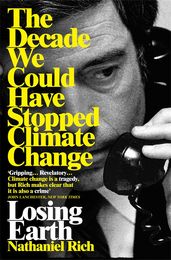Synopsis
'The excellent and appalling Losing Earth by Nathaniel Rich describes how close we came in the 70s to dealing with the causes of global warming and how US big business and Reaganite politicians in the 80s ensured it didn’t happen. Read it.' John Simpson
By 1979, we knew all that we know now about the science of climate change – what was happening, why it was happening, and how to stop it. Over the next ten years, we had the very real opportunity to stop it. Obviously, we failed.
Nathaniel Rich’s groundbreaking account of that failure – and how tantalizingly close we came to signing binding treaties that would have saved us all before the fossil fuels industry and politicians committed to anti-scientific denialism – is already a journalistic blockbuster, a full issue of the New York Times Magazine that has earned favorable comparisons to Rachel Carson’s Silent Spring and John Hersey’s Hiroshima. Rich has become an instant, in-demand expert and speaker. A major movie deal is already in place. It is the story, perhaps, that can shift the conversation.
In the book Losing Earth, Rich is able to provide more of the context for what did – and didn’t – happen in the 1980s and, more important, is able to carry the story fully into the present day and wrestle with what those past failures mean for us at the beginning of the twenty-first century. It is not just an agonizing revelation of historical missed opportunities, but a clear-eyed and eloquent assessment of how we got to now, and what we can and must do before it's truly too late.
Details
Reviews
As Nathaniel Rich observes “nearly every conversation we have in 2019 about climate change was being held
in 1979.” His gripping, depressing, revelatory book makes it clear that not only is climate change a tragedy,
but that it is also a crime — a thing that bad people knowingly made worse, for their personal gain. That,
I suspect, is one of the many aspects to the climate change battle that posterity will find it hard to believe, and
impossible to forgive.
The excellent and appalling Losing Earth by Nathaniel Rich describes how close we came in the 70s to dealing with the causes of global warming and how US big business & Reaganite politicians in the 80s ensured it didn’t happen. Read it.
Others have documented where we are, and speculated about where we might be headed, but the story of how we got here is perhaps the most important one to be told, because it is both a cautionary tale and an unfinished one.
[Losing Earth] chronicles the failure of our scientific and political leaders to act to halt the climate apocalypse when they appeared on the verge of doing so, and casts the triumph of denial as the defining moral crisis for humankind.

